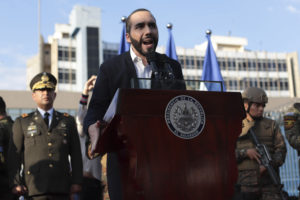The Film ‘In an Ideal World’ Offers a Glimpse Inside Our Broken Prison System
Noel Schwerin spent seven years documenting the lives of a prison warden, a separatist murderer and a former gang member at California's Soledad Correctional Facility. The resulting film not only looks at the lives of these men but also gives viewers a sense of the enormity of the problems facing the American correctional system. Vimeo
Vimeo
Noel Schwerin spent seven years documenting the lives of a prison warden, a separatist murderer and a former gang member at California’s Soledad Correctional Facility. The resulting film, “In an Ideal World,” not only looks at the lives of these men but also gives viewers a sense of the enormity of the problems facing the American prison system — racked by violence, segregation and inhumane conditions, and many other problems.
One of the main goals of the film, Schwerin told Truthdig during a phone interview, is to highlight the fact that these prisoners have been forgotten by society and that, as members of that society, we are all to blame for the tragic state of the facilities that house them.
“Whether we want to reflect on it or not, [these prisons] embody values and priorities that we not only consent to, but we underwrite and perpetuate,” she said. “We cannot dehumanize the people who live and work in prison without simultaneously dehumanizing ourselves.”
One of the most jarring subjects covered in the documentary is the continued racial segregation in the prison — something Schwerin said she didn’t expect.
Prisons “make you a racist,” even if that’s not how you were originally, one corrections officer says in the film. In fact, at one point in the movie, the warden of the prison actually describes the segregation as a tool for keeping order — though he adds that prison officials may have shot themselves in the foot by perpetuating racial divisions that aggravate tensions and can lead to violence.
Soledad had been racially segregated by policy for many years until the state ordered it to start integrating in 2014. That change came in response to a lawsuit filed by a California inmate in 2008, but it clearly has not been fully implemented.
The inmates she focuses on in the film have been locked up for their whole adult lives, and they have witnessed the changes the prison system has faced firsthand.
A prison discussion group — which encourages prisoners to talk about their problems and to explore who they are — is one of the few places in the film where viewers can see a racially mixed group. The purpose of the group is to help inmates learn how to resolve conflicts in a nonviolent manner, and it appears to benefit the prison environment overall.
“The goal is to train more people to train more people inside,” Schwerin told Truthdig. It’s supposed to be a self-sustaining project aimed at giving inmates the tools they need to improve the culture within the prison.
In contrast, at another point in the documentary, a convicted rapist asks to be placed in the Sensitive Needs Yard — a special part of the prison where he can be more protected by corrections officers — because of constant harassment from other prisoners over the nature of his crime. (Convicted rapists are often harassed or harmed in prison.) The man is asked if he knows how to contact mental health professionals, likely so he doesn’t harm himself, and he says that these professionals are not even calling him back when he does reach out.
According to Schwerin, many people are surprised by how intelligent and eloquent some of the prisoners in the film appear to be, because they assume people who end up in prison are somehow different.
“Since we know so very little about [prisoners], and our images are driven by a politics of fear and a popular media bent on sensationalism, the fact that these are people, like us, with families and histories and aspirations comes as a surprise, even a challenge to many people,” she said.
That is one of the reasons Schwerin chose to make the film at Soledad, she added. “It is old-school and more typical of authentic prison than a place like San Quentin where there is a lot of programming and they are accustomed to talking to the outside world.”
If there was one thing she could change about the prison system, she told Truthdig, it would be to increase transparency. If the public just had a better idea of what is actually going on in prisons, she believes that society would feel more moved to change what is going on — from overcrowding and violence to neglect and the lack of healthcare services, the American prison system is rife with problems.
“What seems to be missing from this new conversation about criminal justice reform is the experience of people on the ground, inside prison,” Schwerin said. “We only hear from those on the outside, and there is precious little balanced information available to the public, to policy makers, to judges, to families.”
In An Ideal World Trailer from WORLD Channel on Vimeo.
“In an Ideal World” airs Tuesday, April 26, at 8 p.m. (check local listings) as part of World Channel‘s “America ReFramed” series. The film will be available for free streaming on worldchannel.org starting April 27 to May 25.
Your support matters…Independent journalism is under threat and overshadowed by heavily funded mainstream media.
You can help level the playing field. Become a member.
Your tax-deductible contribution keeps us digging beneath the headlines to give you thought-provoking, investigative reporting and analysis that unearths what's really happening- without compromise.
Give today to support our courageous, independent journalists.




You need to be a supporter to comment.
There are currently no responses to this article.
Be the first to respond.